by Jenny Rose | Oct 21, 2023 | A Flourishing Woman, Body
I came down with COVID this week. It’s the first time I’ve had it, for which I’m thankful, as I’ve been diligent about vaccinations and I’m sure they are mitigating the virus. Three weeks ago I received the latest vaccination, in fact. (And no, I don’t think that’s why I got COVID!) 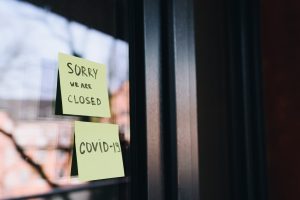
In our current world a positive COVID test is an iron-bound, all-purpose excuse for downing tools, stepping away, and spending some quiet time in solitude. So here I am, on the bench (or in my case, a comfy couch) instead of making my way through my usual work week and routines.
I haven’t been afraid of winding up in the hospital on a ventilator. I’m not especially high risk and in very good health. I’ve been resigned, more than anything else. Resigned that I unknowingly exposed my friends and coworkers before I knew what was happening. Resigned that this is a different viral experience than I’ve ever had before. Resigned that someone else taught my group swimming lessons and enjoyed the kids. Resigned to the fact that now we all have to mask for a time at work.
I’ve been miserable with fever, aches, congestion, and difficulty breathing. The physical symptoms are easing; however, I have entirely lost both taste and smell, perhaps the most distressing symptom of all, in part because it’s so different. Yesterday I ventured out for a walk.
It was breezy and grey with rain moving in, the air warm and soft. I took a short neighborhood walk, enjoying being outside and moving, but struggling with shortness of breath, disoriented by my inability to smell the rain coming and the crisping leaves. I feel cut off from my greatest source of solace, the natural world. I will continue to walk every day because my body needs it, but my joy in being outside is painfully diminished.
When I completed my test route, I felt too tired to do more. I came home and discovered I’d been gone less than 10 minutes.
At times like this I bless my passion for reading. I’ve had eye inflammation and itching with this virus; a symptom I’ve never had before. It worsens as my fever increases and makes looking at a screen or watching TV miserable, as well as sitting in any kind of sunlight. However, I can turn on a lamp and read until I doze, then wake and read some more. This passes the time, keeps me quiet, and distracts me from my present experience.
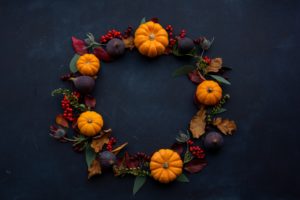
Photo by Joanna Kosinska on Unsplash
This morning I walked again in a light rain. It’s been a dull-colored fall here. Some leaves are finally starting to turn; other trees are mostly bare already. This time I was ready for scent blindness. I turned away from what I couldn’t do and feasted my eyes on the rich colors of fall-blooming flowers and the leaves. A humid breeze fanned my cheek. I focused on breathing, filling my weary lungs with the fresh, damp air, exhaling as well as I could through my nose. I paid attention to what I heard: crows squabbling, an occasional passing car, a barking dog, the subtle background sound of the rain. I walked a longer distance than yesterday.
I haven’t run a fever from more than 24 hours and my throat feels normal again. Progress, although my heart thumps uncomfortably when I’m up and doing things and I have the lingering feeling I’m not getting quite enough air. Still, symptoms are clearly abating.
Benches are not comfortable, for the most part. No back support. Hard under the ass. Sitting on the sidelines watching others live their lives when we can’t participate much in ours is discouraging. So much of my daily centering, comfort, and self-care are bound up with scent. I could not have anticipated how devastated I feel without the simple ability to smell and taste. My scented fall candles, usually a daily pleasure, sit unlit. Tea might as well be plain hot water. Food is absolutely tasteless. I can’t smell when the cat boxes need to be emptied. Cleaning doesn’t smell like cleaning. Fresh air doesn’t smell fresh. Taking a shower, using soap and lotion and putting on clean clothes, is joyless. Eating is a chore.
Yet still there is reading, and writing. I’m washing my sheets. I’ve aired out my room and waved a smudge stick around. I’ve washed the breakfast dishes. The cats are snuggled up with me in my chair. The rain comes down. Another cup of tea cools at my elbow. I picked up a scarlet leaf while I was out walking; an antidote to depression.
In spite of violence, pain, suffering, and illness, the world is beautiful. It welcomes us, shelters us, sustains us. Small pleasures and joys are everywhere, if we only engage with them. Refusing pleasure and peace does not help those who have none. Whatever our circumstance, we are all connected.
Questions:
- How would your life change if you couldn’t smell anything?
- If you had no ability to taste, how might it change your relationship to food?
- In these dark days of twisted politics and violence, what gives you hope?
- What is your favorite indulgence or ritual when you’re sick?
Leave a comment below!
To read my fiction, serially published free every week, go here: 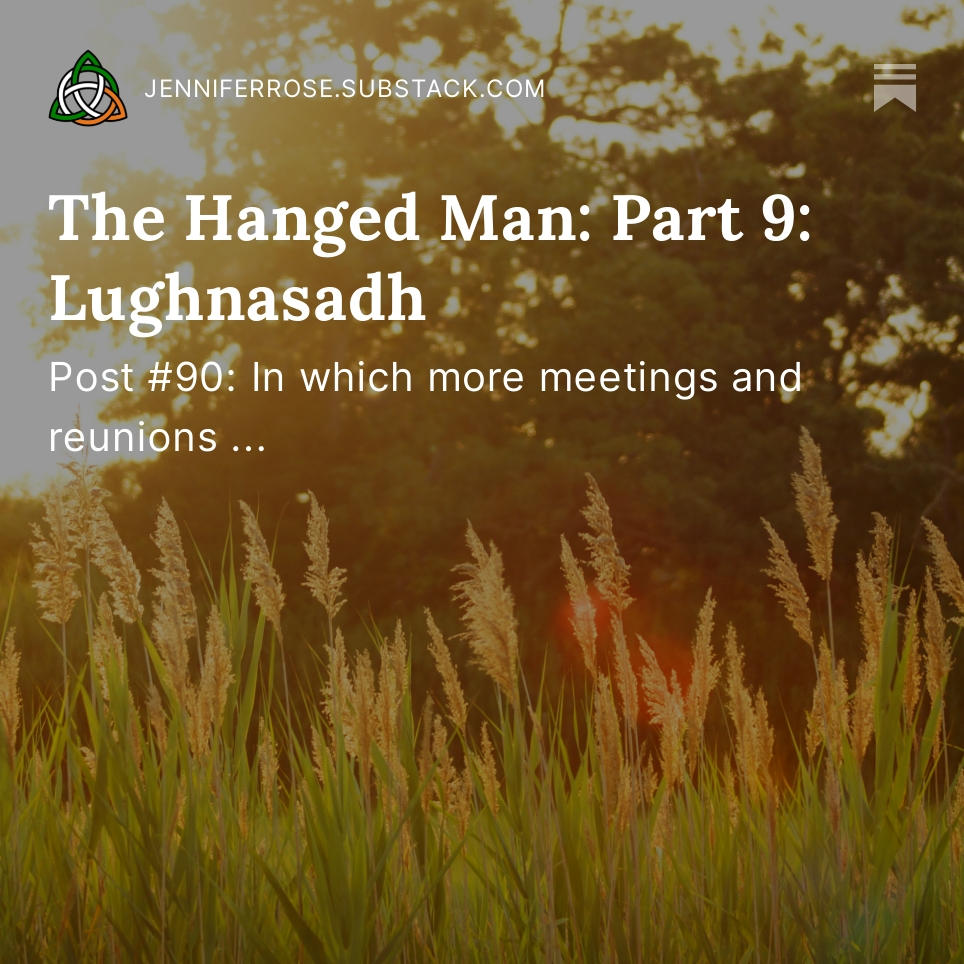
by Jenny Rose | Jul 27, 2017 | Connection & Community, Emotional Intelligence, Holistic Management
My partner and I have hired a permaculture group called the Resilience Hub out of Portland, Maine, to collaborate with us in the development of a 30-year plan for our 26 acres.
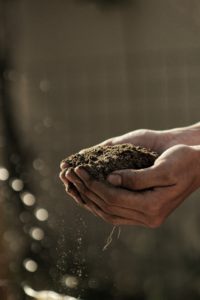
Photo by Gabriel Jimenez on Unsplash
Permaculture, for those of you who didn’t follow the above link, is “the development of agricultural ecosystems intended to be sustainable and self-sufficient.” In other words, it’s a holistic management plan that includes plants, animals (insects, birds and reptiles), people, water and land. The land we live on consists of wetland, a river, a pond, a year-round daylight spring, streams, fields and woodland.
That’s what we tell people, anyway. I’m beginning to understand what permaculture really means to me, though, is a commitment to love.
I’m interested to discover I’ve achieved the ripe old age of 53 and discarded nearly my entire definition of love after two marriages, two long-term non-marriage relationships and raising two children. At this point I know a lot more about what love isn’t than what it is.
Here’s my current working definition: A relationship revolving around what we want others to be is not love. A relationship revolving around the question “Who are you?” is love. Notice sex is not part of the definition. I’m talking about love in the wide sense here, the act of loving another human being, independent of legal or blood ties. For me, this is also the root of self-love. Do we endlessly tell ourselves what we should, must, and have a responsibility to be, or do we allow ourselves to discover who we in fact are?
Creating a permaculture plan for this piece of land is a deliberate and intentional journey into what the land and the life it sustains is, as well as what we are as individuals and as partners. From our most private thoughts and beliefs to the boundary of the 26 acres we live on, we become note takers and observers. We practice surrender and acceptance. We listen and watch with curiosity and attention. We are present every day with ourselves, one another, and the land. We don’t think about imposing our will. We think about collaboration and cooperation, weaknesses and strengths, effectiveness and healing.
The consent to see and be seen is a profound and intimate expression of love rippling from the inside outward. We are not intruders here. We inhabit this land and want to protect and preserve it. The porcupine living in the barn cellar, the owls down by the river, the phoebes nesting in the barn, the passing bear who wiped out our suet feeder, are not intruders, either. The poison ivy, stinging nettle, ticks and mosquitos live here. The snapping turtles in the river and the leeches in the pond call this place home, just as we do. Permaculture is a peace treaty, the practice of appreciation for the variety and complexity of life around us, and the humility to admit much of its elegant mystery is beyond our knowledge or understanding.
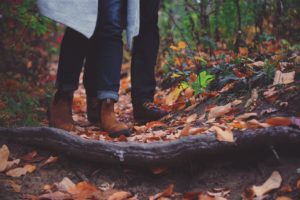
Photo by Takahiro Sakamoto on Unsplash
As I walk these acres, alone, with my partner or in a group with the Resilience Hub, I’m learning the land as I would learn a beloved’s body. I’m noticing the animal trails wandering from field to forest to river, lines and wrinkles of use tracing their way along the land’s contours and folds, suggesting where we, too, might make a path, a place to pause, a spiritual resting place.
I map old stone walls like the delicate sculpture of a spine, huge mossy boulders and landmark trees, learning the texture and landscape of this place. I wander in the thin-skinned places where old bones of ancient glacial esker are revealed. I think about bird nesting boxes, bee and pollinator boxes and honeybee hives.
Over the years, my partner has discovered all the delicate veins of water, daylight and underground, seasonal and year round, the lifeblood of the land. Thick forest hides damp, humid hollows and shallow bowls where mosquitoes fill the leaf-dappled air and the turkey and grouse hide. The grassy hair on the open slopes and fields is twined, in this season, with black-eyed Susan, purple vetch, queen Anne’s lace, wild pinks, blooming milkweed, and red clover.
The land shows us where wildflowers thrive, and which type decorate which season. It demonstrates where water runs, so we know exactly where to position a well. The trees inform us of water availability, drought, crowding, disease and age. The raptors flying over us, hunting, help us know where raptor roosts would be welcome in order to protect the woody agriculture we think of introducing against rodent damage.
As we wander this terrain, we look for nothing and try to see everything. This is how the sun falls during each month of the year. This is where the field floods when the river ice dams thaw in the spring. This is where the doe that was hit on the road lay down and died. This is the special spot where I come, early in the morning, to sit by the river and be alive. This is where the wind strokes the exposed slope, and this is where the trees shelter a small clearing that catches the sun. This is the place where a bittern pounced like a cat on some small rodent by the pond one morning. Here the snow drifts, and here it lies late in the season as the bluets bloom in the boggy field. Here was the old fox den.
Trees topple, decay into humus where fungus thrives and new trees reach for the sun. The land stretches, sheds, sloughs away and reconfigures. Species populations rise and fall. We aspire to that resilience and sustainability. We aspire to the harmony and complexity innate in the landscape around us. We don’t want more than we need to eat, to live, to love. We don’t want to be well-groomed, civilized, obedient and sterilized. We want to root the rest of our lives in the color and scent and texture of the primordial wisdom of life and death as naturally and unapologetically as the raven, the fern or the tree.
Who am I? Who is my partner? What is this land? I believe these are questions that open the way to true love; to sustainability; to reciprocity, respect and surrender. As long as we ask and cherish these questions and receive and cherish the answers, hour by hour, day by day, season by season, cycle by cycle, love endures.
All content on this site ©2017
Jennifer Rose
except where otherwise noted
by Jenny Rose | Apr 6, 2017 | A Flourishing Woman, Creativity
Walking on our 26 acres, my path winds around open fields and keeps me out of heavy woods and brush, where ticks are waking. It’s grey and overcast, not raw but damp, a combination of snow and rain coming down and turning my already wild hair into a mad woman’s wig. The surface of the snow is glazed hard in most places, but when I get close to the tree line or streams that trickle down to the river, I punch through it and sink. Walking on the thick layer of leaves under and among the trees is like walking on a sopping sponge. My socks are sodden inside my winter boots.
I see thickets where the deer have slept, melting the snow with their warm bodies, lying out of the wind in the shelter of trunk and branch. I imagine them rising to their feet, squatting in their awkward way to leave pellets and a splash of urine, and then stepping away through the snow with those delicate hooves and legs. Their spoor is everywhere.
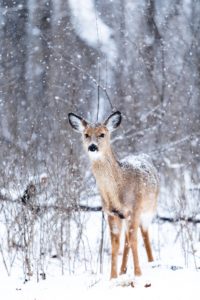
Photo by Teddy Kelley on Unsplash
The medical transcription business is wildly unpredictable. One seesaws between frantic pleas from supervisors for overtime because of a sudden flood of work and the dreaded “no jobs available” message upon logging in. As I’m paid by production, no work means no money. Since the new year, work has been slow in the company and transcriptionists and supervisors alike are feeling the stress.
I’ve been thinking about my fear of not enough these days, and how small it makes me and my experience of life. One of the reasons I like to go out and walk is because it pushes against my tendency to curl up in corners and play hours of solitaire while I make up stories about living under bridges and berate myself for NOT PULLING MY WEIGHT and WASTING TIME.
The river is still ice covered, the edges yellowish and slushy. I see animal prints in the snow over the ice, but I wouldn’t dare try to walk on it. As I lean against a tree and look down at the ice-bound river, I hear a nesting pair of barred owls calling to each other, though it’s still early afternoon.
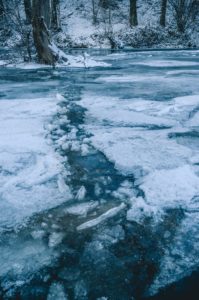
Photo by Vincent Foret on Unsplash
The truth is my medical transcription job is nothing more than a means to an end. It’s all about the paycheck. I take some modest pride in my ability to do an accurate, fast job, but I’m just a pair of skilled hands and ears. One day, when the job and I are finished with one another, I’ll leave no remnants of myself, no track, no scent, no spoor. It irritates me that it has so much power in my life when it means so little.
Water drops tremble on bare twigs and tree branches. The pussy willows are beginning to bud. Cloudy light washes the willow buds and water drops the same silvery grey and I have to draw near to tell the difference.
We’ve lately found a local lawyer to help us update our wills and take care of end-of-life paperwork. It’s made me think about all the fragments I’ll leave behind me, the furniture I’ve loved and polished; the mirror I’ve looked in since I was a child; the books I’ve handled and read in cars, in bathtubs, at tables, in beds and chairs and waiting rooms. All these things will be sifted through, separated, sold, passed on. What money there is will be divided and wind up in other bank accounts or hidey holes or cast back into the flow somehow. Perhaps whispers of me will cling to a few objects, but for the most part no one will ever know I passed this way.
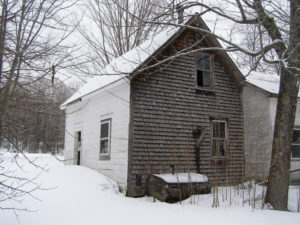
OLYMPUS DIGITAL CAMERA
We have an old shed on the land and snow slide off the roof has blocked the door and partially pushed it open. I’m just able to squeeze in over a thick layer of ice on the threshold, formed by melting snow dripping off the roof.
We cleaned out and swept the shed last fall, but I find pages of paper blown all over the floor, pages of the first draft of my book manuscript. Last summer we had visitors who used the shed, and I’d hoped they would read and give me some feedback. They didn’t, and I’d never found the manuscript when I looked for it after they left, but the winter currents and drafts discovered its hiding place. Perhaps the wind read it as it ruffled through the pages with chill fingers.
It’s odd to see those scattered pages on the cold, splintered floor. The sight of them gives me a desolate clarity. Those written words are the most important thing I have. Working or not working, large paycheck or vanishingly small paycheck, all the objects I love and use and call mine — none of that is really who I am. None of it really matters, though it takes up space in my life. None of it contains the smell of my breath, the taste of my pain or the spoor of my love the way my words do. It’s as though it’s me lying there, discarded, damp and wind strewn, unseen, unread, unwanted. It hurts me.
As I gather up pages, I note where the snow has drifted through gaps in corners. Wrinkled beech leaves lie on a discarded futon, whirled in through the broken window above it. I open a ramshackle cupboard and find a roll of shredded toilet paper and evidence of mice at work, making the most of an unexpected bonanza of nesting material.
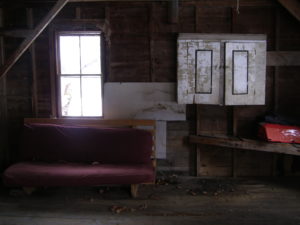
I find a bottle cap and cigarette butts on a window sill. More leavings. I know who stood there, smoking, looking out the window. I stood where he’d stood and picked up the butts, knowing his lips were around them, his long-fingered hand had carried them from pack to mouth and then stubbed them out in the bottle cap, a tiny ashtray. I wish for the nose of a wild creature so I could search for the cold, lonely ghost of his scent.
He was here. I am here. Deer crisscross this land we call ours. Mice go about the business of ensuring more mice, and the barred owls carry on their early spring conversation about mating, nesting, eggs and all those mice. We are so caught up in jobs and money and things. We give them so much meaning. The days go by and we alternately struggle and dance through them. But one day we’ll be gone, and we’ll all leave spoor behind, a scent or sign or footprint uniquely and simply ours.
These words are my footprints, my scent, my lingering warmth in the places I came to rest, my spoor. They are signs of my passage and the truest things I have to leave behind when I’m gone.
All content on this site ©2017
Jennifer Rose
except where otherwise noted








